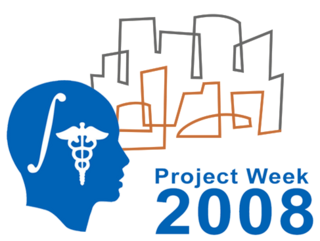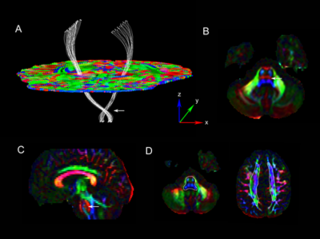Difference between revisions of "2008 Summer Project Week:FluidMechanicsTractographyUCLA"
(New page: {| |thumb|320px|Return to [[2008_Summer_Project_Week|Project Week Main Page ]] |[[Image:Hageman_cspfig4NAMIC_07-06-22.png|thumb|320px|Corticospinal tracts se...) |
|||
| Line 16: | Line 16: | ||
<h1>Objective</h1> | <h1>Objective</h1> | ||
| − | + | Computational fluid dynamics is a rich field and its application to the analysis of diffusion tensor imaging (DTI) datasets has yielded possible applications to tractography, image registration, and white matter pathology. We are developing several useful and novel diffusion tensor imaging (DTI) analysis algorithms modeled on the principles of fluid mechanics for inclusion within the NA-MIC framework. The goal of this project is to develop these methods, make them compatible with the NA-MIC ITK-based software infrastructure (i.e. Slicer), and promote their dissemination to the scientific community. | |
| + | |||
| + | See our [[hageman:NAMICFluidMechDTITractography|Project Page]] for more information. | ||
</div> | </div> | ||
| Line 23: | Line 25: | ||
<h1>Approach, Plan</h1> | <h1>Approach, Plan</h1> | ||
| + | We have developed and initially validated a DTI tractography method based on Navier-Stokes fluid mechanics. See the papers listed in the reference section for complete details on the method. Our approach for this project week will focus on the following: | ||
| + | * Working with NA-MIC members and collaborators to successfully integrate our method in a NA-MIC ITK compatible form with Slicer. | ||
| + | * Working with the tractography group in evaluating data and validating our method. | ||
| − | + | In addition, we hope that our introdution of this method to the NA-MIC community will promote fruitful collaborations. | |
</div> | </div> | ||
| Line 30: | Line 35: | ||
<h1>Progress</h1> | <h1>Progress</h1> | ||
| − | |||
We have made progress in converting our DTI analysis code to work in the ITK/vTK environment. We have created modules for | We have made progress in converting our DTI analysis code to work in the ITK/vTK environment. We have created modules for | ||
*reconstruction of the diffusion tensor and computation of common DTI scalar volumes (FA, LI, RGB) | *reconstruction of the diffusion tensor and computation of common DTI scalar volumes (FA, LI, RGB) | ||
| Line 36: | Line 40: | ||
*reconstruction of tracts based on the above fluid velocity volume | *reconstruction of tracts based on the above fluid velocity volume | ||
| − | Current work is focusing on optimizing the code for the above modules and integrating them as tools in NAMIC's Slicer software environment. | + | Current work is focusing on optimizing the code for the above modules and integrating them as tools in NAMIC's Slicer software environment. Specifically, we are working on the following aspects: |
| + | * Integration of method into Slicer 3 | ||
| + | ** Finished initial coding of method in itk | ||
| + | ** Continuing work on the following features: | ||
| + | *** Multi-Threaded Implementation | ||
| + | *** Fluid velocity vector field animation | ||
| + | *** Layout for Slicer 3 Plug-in | ||
</div> | </div> | ||
| Line 47: | Line 57: | ||
===References=== | ===References=== | ||
* NS Hageman, DW Shattuck, K Narr, AW Toga. A Diffusion tensor imaging tractography method based on Navier-Stokes Fluid Mechanics. In Proceedings of the 2006 IEEE International Symposium on Biomedical Imaging, 2006. | * NS Hageman, DW Shattuck, K Narr, AW Toga. A Diffusion tensor imaging tractography method based on Navier-Stokes Fluid Mechanics. In Proceedings of the 2006 IEEE International Symposium on Biomedical Imaging, 2006. | ||
| + | * Hageman NS, Toga AW, Narr K, Shattuck DW (2008). A diffusion tensor imaging tractography algorithm based on Navier-Stokes fluid mechanics. IEEE Trans. in Medicial Imaging, In Submission. | ||
| + | * Hamilton L, Nuechterlein K, Hageman NS, Woods R, Asarnow R, Alger J, Gaser C, Toga AW, Narr K (2008). Mean Diffusivity and Fractional Anisotropy as Indicators of Schizophrenia and Genetic Vulnerability, Neuroimage, In Submission. | ||
Revision as of 09:19, 16 June 2008
Home < 2008 Summer Project Week:FluidMechanicsTractographyUCLA Return to Project Week Main Page |
Key Investigators
- UCLA: Nathan Hageman
- UCLA: Arthur Toga, Ph.D
- Georgia Tech: John Melonakos (interested collaborator)
Objective
Computational fluid dynamics is a rich field and its application to the analysis of diffusion tensor imaging (DTI) datasets has yielded possible applications to tractography, image registration, and white matter pathology. We are developing several useful and novel diffusion tensor imaging (DTI) analysis algorithms modeled on the principles of fluid mechanics for inclusion within the NA-MIC framework. The goal of this project is to develop these methods, make them compatible with the NA-MIC ITK-based software infrastructure (i.e. Slicer), and promote their dissemination to the scientific community.
See our Project Page for more information.
Approach, Plan
We have developed and initially validated a DTI tractography method based on Navier-Stokes fluid mechanics. See the papers listed in the reference section for complete details on the method. Our approach for this project week will focus on the following:
- Working with NA-MIC members and collaborators to successfully integrate our method in a NA-MIC ITK compatible form with Slicer.
- Working with the tractography group in evaluating data and validating our method.
In addition, we hope that our introdution of this method to the NA-MIC community will promote fruitful collaborations.
Progress
We have made progress in converting our DTI analysis code to work in the ITK/vTK environment. We have created modules for
- reconstruction of the diffusion tensor and computation of common DTI scalar volumes (FA, LI, RGB)
- computation of fluid velocity vector field volume
- reconstruction of tracts based on the above fluid velocity volume
Current work is focusing on optimizing the code for the above modules and integrating them as tools in NAMIC's Slicer software environment. Specifically, we are working on the following aspects:
- Integration of method into Slicer 3
- Finished initial coding of method in itk
- Continuing work on the following features:
- Multi-Threaded Implementation
- Fluid velocity vector field animation
- Layout for Slicer 3 Plug-in
References
- NS Hageman, DW Shattuck, K Narr, AW Toga. A Diffusion tensor imaging tractography method based on Navier-Stokes Fluid Mechanics. In Proceedings of the 2006 IEEE International Symposium on Biomedical Imaging, 2006.
- Hageman NS, Toga AW, Narr K, Shattuck DW (2008). A diffusion tensor imaging tractography algorithm based on Navier-Stokes fluid mechanics. IEEE Trans. in Medicial Imaging, In Submission.
- Hamilton L, Nuechterlein K, Hageman NS, Woods R, Asarnow R, Alger J, Gaser C, Toga AW, Narr K (2008). Mean Diffusivity and Fractional Anisotropy as Indicators of Schizophrenia and Genetic Vulnerability, Neuroimage, In Submission.
